When I first started raising goats on my small farm, I had many questions. What should I feed them? How much is too much? It wasn’t long before I found myself asking, can goats eat corn? I quickly learned that goats can eat corn, but there’s more to it than that simple answer. Like us, goats need a balanced diet to stay healthy and thrive, and corn should only be a part of that diet.
I’ve spent countless hours researching the best nutrition for my goats and adjusting their diets to suit their needs. My goats are more than just livestock to me – they’re part of my family. I’ve watched them grow from curious kids into strong, healthy adults while tweaking their diets to ensure they get the right balance of nutrients.
In this article, I’ll share what I’ve learned about feeding corn to goats – the benefits, the potential risks, and how to do it right. Whether you’re a seasoned goat farmer or just starting, you’ll find valuable insights to help you make informed decisions about your goats’ nutrition.
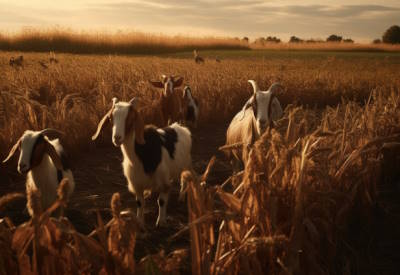
Overview of a goat’s diet
Like all animals, goats require a balanced diet to maintain their health and wellbeing. Understanding what constitutes a balanced diet for goats is crucial for those who care for these playful and curious creatures.
Understanding Goat Nutrition
Goats are ruminants, which means they have a specialized stomach that allows them to break down fibrous plants like grasses, shrubs, and weeds. Their diet primarily consists of forages, which include grasses and legumes, and they can digest these better than grains.
Nutrients such as protein, carbohydrates, fats, vitamins, and minerals are vital in a goat’s diet. A healthy diet will give goats the energy they need to grow, reproduce, and stay active.
The Importance of a Balanced Diet for Goats
A balanced diet for goats is essential for their overall health and productivity. It helps maintain their weight, ensure proper digestion, and keep their immune system strong. A well-balanced diet also plays a crucial role in the quality of the products obtained from goats, such as meat, milk, or wool.
[GoatAffiliate]
Can Goats Eat Corn?
One question that often comes up among goat owners and caretakers is whether goats can eat corn. Let’s explore this topic in more detail.
The Simple Answer: Yes, in Moderation
Goats can eat corn, but like any other food, it should be given in moderation. Corn is a good energy source for goats, as it’s rich in carbohydrates. It can be a beneficial supplement to their diet, especially in colder months when they need extra energy to stay warm.
How Corn Can Benefit Goats: Nutrients and Energy
Corn is high in carbohydrates and can provide the quick energy that goats sometimes need. It also contains essential nutrients such as vitamins, minerals, and protein. Feeding corn to your goats can help them gain weight, which can be especially useful if you have underweight goats.
When to Feed Corn to Goats
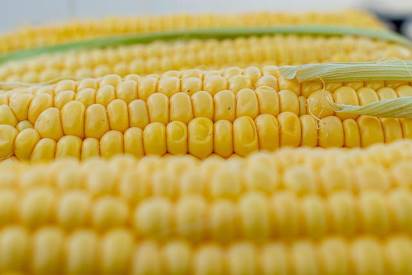
Knowing when to feed corn to your goats is essential to ensure they benefit from it without any adverse effects.
Seasonal Considerations: Winter and Cold Weather Feeding
In winter, goats require more energy to maintain their body temperature. Corn, a high-energy food, can be an excellent supplement during colder months. However, it should not replace their regular forage-based diet.
Situational Feeding: Breeding, Pregnancy, and Lactation
Goats might require extra nutrients and energy during certain stages of their lives, such as breeding, pregnancy, and lactation. Corn can be a useful supplement during these times, but it’s essential to consult with a veterinarian or a goat nutritionist to determine the appropriate amount.
Potential Risks of Feeding Corn to Goats
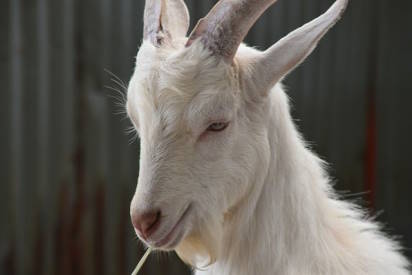
Feeding corn to goats is not without its risks. Awareness of these risks and taking precautions to avoid health issues is essential.
Overconsumption Dangers: Obesity and Nutritional Imbalances
One of the risks associated with feeding corn to goats is overconsumption. Too much corn in a goat’s diet can lead to obesity and nutritional imbalances. Since corn is high in carbohydrates and low in fiber, it can quickly lead to weight gain if not fed in moderation.
Health Risks: Bloat, Enterotoxemia, and Digestive Issues
Feeding too much corn can cause health issues such as bloat, enterotoxemia (also known as overeating disease), and digestive problems. These conditions can be serious and even fatal if not addressed promptly.
Proper Corn Feeding Guidelines
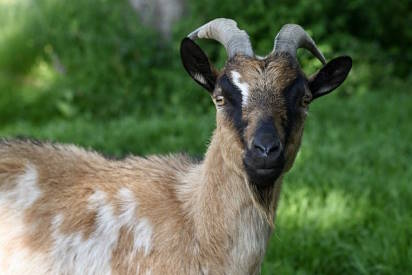
If you decide to feed corn to your goats, following proper guidelines to ensure their health and wellbeing is crucial.
Types of Corn to Feed: Whole, Cracked, or Processed
You can feed your goats different types of corn, including whole, cracked, or processed corn. Each type has its benefits and considerations. Whole corn lasts longer in storage but can be harder for goats to digest. Cracked corn is easier to digest but can spoil faster. Processed corn can be a good option but might contain additives unsuitable for goats.
Recommended Portion Sizes: How Much is Too Much?
As a general rule of thumb, corn should not make up more than 10% of a goat’s diet. However, the exact amount will depend on factors such as the goat’s age, weight, and overall health, as well as their regular diet and activity level.
Mixing Corn with Other Feed: Forage, Hay, and Supplements
It’s essential to balance corn with other types of feed, such as forage, hay, and supplements. This will ensure your goats get a well-rounded diet with all the necessary nutrients.
Alternative Grain Options for Goats
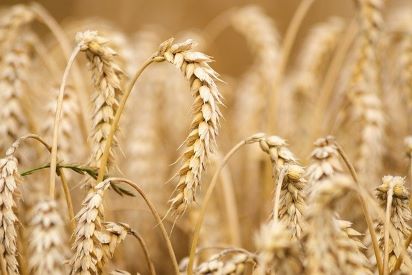
If you’re considering feeding grains to your goats, you might want to explore alternatives to corn.
Benefits and Risks of Other Grains: Barley, Oats, and Wheat
Grains like barley, oats, and wheat can also benefit goats, offering a unique nutrient profile. However, like corn, these grains should be fed in moderation to avoid health issues.
Incorporating Variety: Rotating Grains and Feeds
To provide a well-rounded diet, consider rotating different grains and feeds. This will ensure that your goats get a variety of nutrients and prevent them from getting bored with their food.
How to Store Corn Properly
Storing corn properly is crucial to ensure it remains fresh and free from contaminants. The correct storage conditions not only help in maintaining the nutritional quality of the corn but also prevent wastage.
Importance of Keeping Corn Dry and Away from Pests
Corn, like most grains, needs to be kept dry. Moisture can cause mold growth, making it unsafe for your goats. Additionally, pests such as rodents and insects are attracted to corn. Contaminated corn can cause health issues in goats, so it’s essential to store it in a manner that prevents pest access.
Recommendations for Proper Storage Methods
- Store corn in airtight containers to keep it fresh and prevent moisture from getting in.
- Keep the containers in a cool, dry place, away from direct sunlight.
- If you’re storing large quantities of corn, consider using metal bins or silos that are pest-proof.
- Regularly check the stored corn for signs of mold, pests, or spoilage.
- Always use older corn first and rotate your stock to ensure you’re not feeding stale corn to your goats.
Signs Your Goats Might Be Overeating Corn

Overeating corn can have adverse effects on goats. By being observant and attentive, you can spot signs of overconsumption early and take appropriate action.
Behavioral Changes to Look Out For
- Loss of interest in other types of feed, like hay or forage
- Frequent trips to the feeding area, indicating excessive hunger
- Aggressive behavior during feeding times
Physical Signs of Overconsumption
- Rapid weight gain or obesity
- Bloating or an unusually distended abdomen
- Changes in feces, like diarrhea or unusually dry, hard stools
- Signs of lethargy or sluggishness
Tips for Introducing Corn into a Goat’s Diet
Introducing corn into your goats’ diet should be a gradual process. This will help you observe how your goats react to the new addition and prevent sudden digestive issues.
Gradually Introducing Corn
Start by adding a small amount of corn to their regular feed. Over a week or two, you can gradually increase the amount while observing your goats for any changes in behavior or signs of discomfort. It’s important not to rush this process. Slowly introducing corn helps their digestive systems adapt to the new food.
Observing Your Goats for Any Adverse Reactions
Keep an eye on your goats as you introduce corn. Look for any signs of digestive distress, changes in behavior, or physical discomfort. If you notice any adverse reactions, it’s essential to scale back and consult with a veterinarian. Remember that each goat is different, and while some may take to corn without any issues, others might be more sensitive.
What Other Grains Can Goats Eat Apart from Corn?
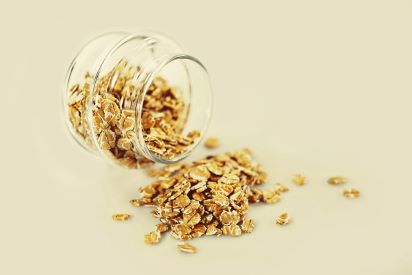
While corn can be an excellent supplement to a goat’s diet, it’s essential to consider other grains that can be included in their meals. Here, we explore five common grains and whether they are suitable for goats to eat.
Bread
Bread can be given to goats but should be offered in moderation. Like corn, bread is high in carbohydrates and can lead to obesity if given in excess. Additionally, certain bread can contain ingredients unsuitable for goats, such as high salt, sugar, and preservatives. It’s best to avoid feeding moldy or stale bread, as it can cause digestive issues.
Read More: Can Goats Eat Bread? Yes, But Moderation Is Key
Oats
Oats are an excellent option for goats. They are high in nutrients and fiber, making them a beneficial supplement to a goat’s diet. Oats can be fed whole, crushed, or rolled and are easier to digest than corn. Because oats are less energy-dense than corn, they are a good choice for adding variety to a goat’s diet without the risk of rapid weight gain.
Read More: Can Goats Eat Oats? Simple Answer & Feeding Tips
Popcorn
Popcorn, believe it or not, can be an occasional treat for goats. Offering plain, air-popped popcorn without added butter, salt, or flavors is best. Remember that popcorn should only be given as a treat, not a regular part of a goat’s diet. Even though it’s a fun and crunchy snack, it doesn’t provide the essential nutrients that goats need.
Read More: Can Goats Eat Popcorn? 5 Reasons It’s Not A Good Idea
Rice
Rice is another grain that can be fed to goats in moderation. Cooked rice is easier for goats to digest and can be a good source of carbohydrates. However, rice lacks the necessary nutrients to be a staple in a goat’s diet. If you feed your goats rice, ensure it’s plain, cooked, and free of added seasonings.
Read More: Can Goats Eat Rice? 5 Amazing Benefits
Wheat
Wheat can be an excellent addition to a goat’s diet. It is high in energy and nutrients, making it a good option for supplementing their meals. However, like corn, wheat should be fed in moderation. Balancing wheat with forage and other grains is essential to prevent obesity and ensure a well-rounded diet.
Read More: Can Goats Eat Wheat? 5 Great Benefits
Can goats eat corn – final thoughts
So there you have it – goats can eat corn, but as with all good things, moderation is key. It’s just like sneaking a slice of cake for a snack; it’s okay occasionally, but you wouldn’t replace all your meals with it. Corn can give your goats a quick energy boost, especially during the winter or at certain stages of their lives. However, overdoing it can lead to obesity, nutritional imbalances, and other health issues.
In the quest to raise happy, healthy goats, a balanced diet is essential. Alongside corn, ensure you provide your goats with a good mix of forages, hay, and supplements. Keep them active, and monitor their health regularly. With the proper nutrition and care, your goats will not only thrive but provide you with endless moments of joy and maybe some mischief, too!
